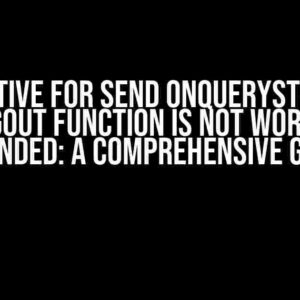Have you been trying to integrate the SpeechRecognizer from Azure SDK for JavaScript into your Android app, only to find that it’s not working as expected? You’re not alone! Many developers have stumbled upon this frustrating issue, and today, we’re going to tackle it head-on. By the end of this article, you’ll be well-equipped to overcome this hurdle and get your SpeechRecognizer up and running on Android devices.
Understanding the SpeechRecognizer from Azure SDK for JavaScript
The SpeechRecognizer is a powerful tool that enables users to convert spoken words into text. It’s an essential component of many applications, from virtual assistants to language translation apps. The Azure SDK for JavaScript provides a convenient way to integrate this functionality into your projects. However, as many developers have discovered, it’s not a straightforward process – especially when it comes to Android devices.
The Problem: SpeechRecognizer Not Working on Android Devices
So, what’s going on? Why is the SpeechRecognizer from Azure SDK for JavaScript not working on Android devices? The answer lies in the complexities of browser-based speech recognition and the limitations of the Android platform. Here are a few reasons why you might be experiencing issues:
- Browser limitations: Android’s default browser, Chrome, has limited support for WebRTC (Web Real-Time Communication) – a crucial technology for speech recognition. This can lead to issues with speech recognition functionality.
- Platform restrictions: Android has strict policies regarding device access and permissions. Your app might not have the necessary permissions to access the device’s microphone, resulting in speech recognition failures.
- SDK configuration: Incorrect or incomplete configuration of the Azure SDK for JavaScript can also cause issues with the SpeechRecognizer.
Troubleshooting and Fixing the SpeechRecognizer on Android Devices
Now that we’ve identified the potential causes, let’s dive into the solutions. Follow these steps to troubleshoot and fix the SpeechRecognizer on Android devices:
Step 1: Verify Browser Support
Ensure that you’re using a compatible browser that supports WebRTC. You can check the browser’s WebRTC support using the following code:
if (!!window.RTCSessionDescription) {
console.log("WebRTC is supported");
} else {
console.log("WebRTC is not supported");
}If your browser doesn’t support WebRTC, consider using a polyfill or switching to a compatible browser like Google Chrome or Mozilla Firefox.
Step 2: Obtain Necessary Permissions
Make sure your app has the necessary permissions to access the device’s microphone. Add the following code to your AndroidManifest.xml file:
<uses-permission android:name="android.permission.RECORD_AUDIO" />This will grant your app permission to access the microphone.
Step 3: Configure the Azure SDK for JavaScript
Verify that you’ve configured the Azure SDK for JavaScript correctly. Make sure you’ve imported the necessary libraries and initialized the SpeechRecognizer:
<script src="https://cdn.jsdelivr.net/npm/@azure/[email protected]/dist/cognitiveservices-speech-sdk.min.js"></script>
const speechConfig = new SpeechConfig("YOUR_SPEECH_KEY", "YOUR_SPEECH_REGION");
const speechRecognizer = new SpeechRecognizer(speechConfig);Replace “YOUR_SPEECH_KEY” and “YOUR_SPEECH_REGION” with your actual Azure Speech Services key and region, respectively.
Step 4: Test and Verify SpeechRecognizer Functionality
Create a simple test to verify that the SpeechRecognizer is working as expected:
speechRecognizer.recognizeOnceAsync().then(result => {
console.log(`Recognized text: ${result.text}`);
}).catch(error => {
console.error(`Error: ${error}`);
});This code will attempt to recognize spoken words and log the result to the console. If you encounter any errors, review the error message to identify the issue.
Common Issues and Workarounds
While troubleshooting the SpeechRecognizer, you might encounter some common issues. Here are some workarounds to help you overcome these hurdles:
| Issue | Workaround |
|---|---|
| Error: “MediaStreamTrack.getSources is not supported” | Use the MediaStreamTrack.getSources() polyfill for Android devices. |
| Error: “NotAllowedError: Permission denied” | Verify that your app has the necessary permissions and try again. |
| Error: “NetworkError: Failed to fetch” | Check your Azure Speech Services key and region, and ensure that your app is connected to the internet. |
Conclusion
Integrating the SpeechRecognizer from Azure SDK for JavaScript into your Android app can be a complex process, but by following these steps and troubleshooting common issues, you should be able to get it working smoothly. Remember to verify browser support, obtain necessary permissions, configure the Azure SDK for JavaScript correctly, and test and verify SpeechRecognizer functionality. Happy coding!
Additional resources:
- Azure Speech Services documentation: https://docs.microsoft.com/en-us/azure/cognitive-services/speech-service/speech-sdk
- Azure SDK for JavaScript repository: https://github.com/Azure/azure-sdk-for-js/tree/master/sdk/cognitiveservices/speech-sdk
Here are 5 Questions and Answers about “SpeechRecognizer from Azure SDK for Javascript not working on Android devices”:
Frequently Asked Question
Having trouble with SpeechRecognizer from Azure SDK for Javascript on Android devices? We’ve got you covered!
Why is my SpeechRecognizer not working on Android devices?
Make sure you’ve added the `android.permission.RECORD_AUDIO` permission to your AndroidManifest.xml file. Without this permission, your app won’t be able to access the microphone, which is required for speech recognition.
I’ve added the permission, but it still doesn’t work. What’s going on?
Check if your Android device has granted the `RECORD_AUDIO` permission to your app. Go to your app’s settings, then Permissions, and make sure the toggle is turned on for Microphone. If it’s not, toggle it on and try again.
Is there a specific configuration I need to set up for Android?
Yes, you need to set the ` SpeechConfig.speechRecognitionLanguage` to a language that’s supported by Azure Speech Services on Android devices. Currently, the supported languages are en-US, fr-FR, de-DE, it-IT, es-ES, pt-BR, zh-CN, ja-JP, and ko-KR.
How do I handle errors when using SpeechRecognizer on Android?
You can use the `recognizer.recognizeOnceAsync()` method to recognize speech, and then handle errors by checking the `result.reason` property. If it’s `Error` or `NoMatch`, you can display an error message to the user or retry the recognition.
Can I use SpeechRecognizer with React Native on Android?
Yes, you can use SpeechRecognizer with React Native on Android. You need to install the `@azure/cognitiveservices-speech-sdk` package and import it in your React Native project. Then, follow the Azure Speech Services documentation to set up the SpeechRecognizer and implement speech recognition in your app.


